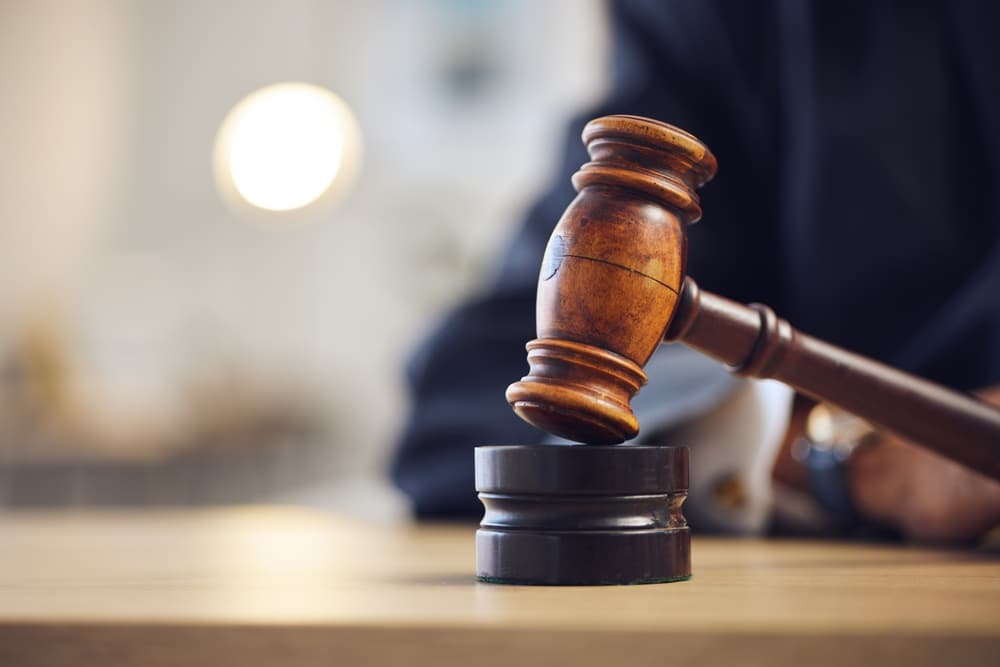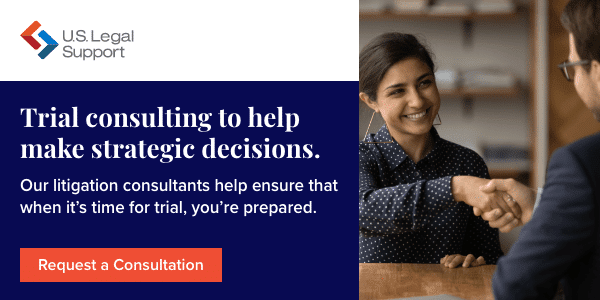Bench Trial vs. Jury Trial: Preparing for Each

When a case proceeds to trial, a legal team may face a critical decision about whether to have it adjudicated by a jury of peers or a single judge.
Both options can offer benefits depending on the merits and subject matter of a case and other factors—including what you know about the judge in question. In addition to the potential to influence a trial outcome, this decision impacts how you plan and proceed with preparation, from research to refining the most impactful arguments.
What’s the Difference Between Bench and Jury Trials?
Choosing your trial type means either working with a single individual well-versed in the law or a dozen with little legal experience. This means answering the question: who is best positioned to decide a case outcome and assign damages?
Jury Trials
A jury trial is what’s most often shown in movies and on television, where members of the public are sworn in to hear both sides of a case and vote on a decision.
Jurors must reach a unanimous verdict in a federal criminal trial. This requirement has been extended to all states for serious criminal cases following the 2020 Supreme Court decision in Ramos v. Louisiana.1 For civil trials, federal juries must vote unanimously but states are split on the issue, with 27 currently allowing majority decisions rather than requiring unanimity. If jurors can’t agree to the extent required by the court, the trial ends in a hung jury, and the civil case returns to its pretrial position.
The duration of jury trials is what sets them apart from bench trials at a practical level. A trial by your client’s peers will take longer because of:
- The jury selection process, scheduling, and instruction
- Deliberation by individuals who typically have little experience with legal procedures
- Managing trial elements that can’t take place in front of a jury
Bench Trials
When you opt for a bench trial vs. jury trial, the decision-maker at all stages of the proceeding is the assigned judge. While judges play an authoritative role in jury trials, and often have the ability to accept or reject a jury’s findings, they more typically act in a role that combines referee to the legal teams and coach to the jurors.
With a bench trial, all of the witnesses, evidence, and arguments are put forth directly to the judge. Compared to juries, a judge at a bench trial is often assumed to be more2:
- Equipped to observe gruesome or violent facts without emotional upset
- Able to discount negative publicity and news coverage
- Capable of focusing on facts rather than a client’s record, hostility, or disconcerting affect
Plus, since the decision to waive a jury trial is typically available after a judge is assigned to a case, a legal team may be familiar with the judge’s reputation or treatment of certain cases and whether those factors would or would not benefit their client.
Who Makes the Decision?
The short answer is: the defendant has the right to waive a jury and opt for a bench trial. But in reality, there are exceptions and jurisdictional differences that affect who can request or decide the trial type.
The right to a trial by jury at the federal level is built into the United States Bill of Rights under the Sixth (criminal trials) and Seventh (civil trials) Amendments.3 State constitutions and courts differ in detail, although many follow federal rules.
- Federal criminal and civil trials – Defendants can request the waiver of a jury, which will be granted only if the judge and prosecutor (or plaintiff) both agree.
- State criminal trials – Most states allow defendants to waive a jury trial, although they usually require that the judge and/or prosecutor approve the request.4 A few allow an absolute right to a waiver without permitting a veto from the court or opposing counsel.
- State civil trials – While states are not required to apply the Seventh Amendment to civil trials, most recognize the right to a civil trial by jury at certain levels of dispute. Similar to state criminal trials, defendants can waive this right in favor of a bench trial in most states if the judge and/or plaintiff agree.
- Exceptions – Some states require jury trials for death penalty cases. On the other hand, bench trials are typically the standard (without the right to a jury trial) when it comes to juvenile court and misdemeanor cases (lower or municipal courts) or minor civil matters (small claims or conciliations courts).
Where rights to both a trial by jury and the ability to waive it exist, it is ultimately the defendant’s right to choose (not the attorney’s).
Research Judicial Rulings
While you can hope for the best case scenario if you choose a bench trial, judges are, after all, human. Ideally, you’ll face a top-notch legal scholar who applies rulings free of bias or assumptions, but preparation always trumps blind faith.
On the glass-half-full side, you have access to a body of ruling decisions and statements that you can study to look for:
- Experience with bench trials
- Trends that apply to your case, client, story, arguments, and evidence
- Verdict, damages, and sentencing statistics compared to jurisdictional averages
- Details of reasoning given in written judicial opinions
Analyze the Assigned Judge
The jury selection process is complex with jury trials, often backed by research, focus groups, mock trials, and jury consultants. For a bench trial, apply a similar process when preparing to argue before a particular judge. Consider their:
- Unspoken clues – What can you pick up from body language and orientation, eye contact, and other nonverbal cues? Is that a change in affect, tone and speed of voice, or any signs of stress or discomfort during particular motions, requests, or issues?
- Reputation – What can you glean from colleagues who are familiar with or have argued in front of this judge? What is the general perception of their level of fairness, strictness, or other factors?
- Bias – Can you uncover any apparent biases, prejudices, or preferences in how they respond to types of individuals or situations? For instance, are they more impatient with senior or junior members of a trial team? Do they express sociopolitical leanings?
- Communication style – Are they more formal or casual? Do they engage with or become irritated at humor?
Unlike a jury selection, you can’t simply dismiss a judge from the potential pool. Instead, use the same investigative and analytical tools used during jury selection to help determine:
- Whether to choose a bench trial before this judge over a jury trial
- What arguments, themes, strategies, and tactics may be problematic for a specific judge
- How to leverage biases or preferences that you can leverage for your case
Preparing Your Arguments
From the overall trial theme or story to the specific language used during your statements, your trial strategy and tactics will differ depending on a bench trial vs. jury trial.
With a jury trial, you need to win over a variety of individuals with unique perspectives, values, and backgrounds. Much of your time is spent ensuring that they understand critical evidence—sometimes technical or complex—and comprehend the laws and procedures at issue.
For bench trials, you have an audience of one who also controls the process and has the power to interrupt, ask questions, and communicate expectations with you and your witnesses directly. Your arguments may focus more on matters of law and precedence rather than emotional appeal, although you’ll still need to ensure you tell a cohesive story.
Evidence and Trial Presentations
The evidence that you present may differ depending on adjudication, with more stringent standards and limits for jury trials. Judges at bench trials may be more apt to allow evidence that would be excluded from a jury such as:
- Hearsay
- Unfairly prejudicial or inflammatory evidence
- Expertise without adequate merit or foundation
- Evidence in writing
- Deposition testimony
Trial slides, graphics, video clips, and other presentation components may be more technical in relation to points of law, and in some cases more concise or with less reliance on emotional impact.
Preparing Witnesses
With a jury trial, preparation is critical to ensure that your witnesses demeanor and communication help convince jurors of your client’s story. They need to present an appropriate emotional affect, answer opposing counsel’s questions factually and succinctly, and, in the case of experts, communicate effectively with laypersons.
Testifying for the judge in a bench trial can be a different experience. In particular, they should expect direct questions from the judge and the potential to explore more territory than would be allowed before a jury.
TrialQuest Provides Expert Preparation for All Trial Types
Choice of adjudication is a critical factor in case outcomes. Understanding how judges’ and jurors’ decision-making differs and how demographics, backgrounds, and characteristics can contribute to beliefs and behaviors is a complex challenge that requires both courtroom experience and behavioral expertise.
TrialQuest can tailor witness preparation, trial graphics and demonstratives, and trial presentation and technology services to either bench or jury trials.
We’ve provided key trial services in more than 53,000 high-risk trials, arbitrations, and mediations across all practice areas. From discovery through post-trial, we partner with legal teams on adjudication decisions, venue evaluation and research, early risk assessment, mock trials, focus groups and shadow juries, and jury research, profiling, and selection.
Plus, our core U.S. Legal Support teams offer multi-methodology court reporting, interpreting and translation services, record retrieval, analysis, and organization, and more.
Contact us today by phone, email, or website request form to discuss how we can help with your adjudication selection, trial preparation, and other litigation support needs.
Sources:
- Findlaw. Must All Jury Verdicts Be Unanimous? https://www.findlaw.com/litigation/legal-system/must-all-jury-verdicts-be-unanimous.html
- UpCounsel. What Is a Jury Trial Waiver? https://www.upcounsel.com/jury-trial-waiver
- Cornell Law School. right to jury trial. https://www.law.cornell.edu/wex/right_to_jury_trial
- Lawyers.com. Can Defendants Waive the Right to a Jury Trial? https://legal-info.lawyers.com/criminal/criminal-law-basics/waiving-the-right-to-a-jury-trial.html

Editoral Policy
Content published on the U.S. Legal Support blog is reviewed by professionals in the legal and litigation support services field to help ensure accurate information. The information provided in this blog is for informational purposes only and should not be construed as legal advice for attorneys or clients.


